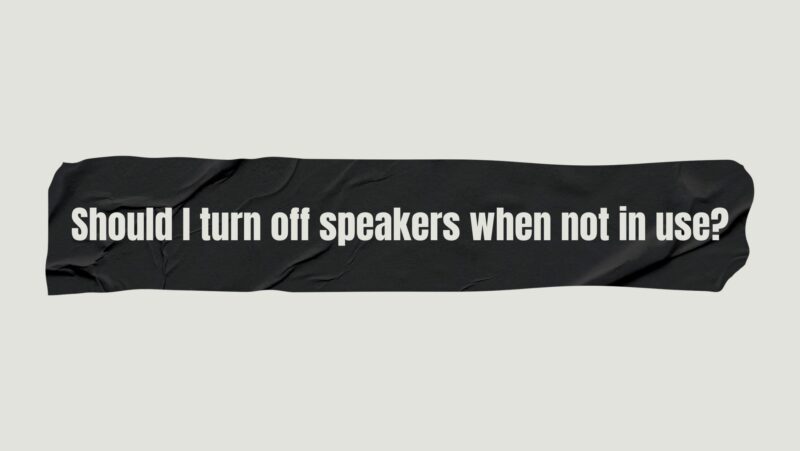In the world of audio enthusiasts and casual listeners alike, a question frequently arises: should speakers be turned off when not in use? With the advancement of technology and an increasing emphasis on energy conservation, the topic of whether to power down speakers has gained prominence. In this comprehensive article, we delve into the multifaceted debate surrounding whether speakers should be turned off during periods of inactivity, considering factors such as energy efficiency, speaker longevity, audio quality, and user convenience.
Energy Efficiency and Environmental Impact
- Reducing Energy Consumption: One of the primary reasons to turn off speakers when not in use is energy conservation. Speakers, like most electronic devices, consume electricity even in standby mode, contributing to unnecessary energy consumption.
- Lower Carbon Footprint: Unnecessary energy consumption not only leads to higher electricity bills but also contributes to carbon emissions and environmental degradation. Turning off speakers aligns with eco-friendly practices and efforts to reduce one’s carbon footprint.
- Standby Power Consumption: Some modern speakers are designed to enter standby mode when not actively playing audio. However, even in this mode, they continue to consume energy. Completely turning off the speakers eliminates standby power consumption.
Speaker Longevity and Performance Implications
- Component Wear and Tear: Continuous operation can lead to gradual wear and tear on the internal components of speakers. This includes drivers, crossovers, amplifiers, and other electronics that might experience stress over time.
- Heat Generation: When speakers remain powered on, they generate heat, which can potentially impact the longevity and performance of internal components. Heat stress can degrade solder joints, affect internal materials, and lead to eventual malfunction.
- Preserving Audio Quality: Keeping speakers powered on constantly might contribute to audio quality degradation due to component fatigue and the accumulation of heat-related damage.
Audio Quality Considerations
- Reducing Background Noise: Powered speakers that remain on even during periods of inactivity can generate background noise or hiss, which can diminish the overall audio experience.
- Minimizing Interference: Turning off speakers when not in use can reduce electromagnetic interference and potential signal degradation, leading to cleaner and more accurate audio reproduction.
User Convenience and Practicality
- Balancing Convenience: Keeping speakers powered on provides instant access to audio playback, eliminating any delay in enjoying music or other content.
- Technology Advances: Some modern speakers feature automatic standby modes that help balance user convenience with energy conservation. These modes aim to reduce power consumption without sacrificing quick accessibility.
Practical Tips for Turning Off Speakers
- Manual Power Switches: If your speakers have a manual power switch, using it to turn them off completely is the most effective way to cut power.
- Standby Modes: Utilizing standby modes provided by certain speakers offers a compromise between instant accessibility and energy efficiency.
- Power Strips and Timers: Employing power strips with individual switches or timer-equipped outlets can help automate the process of turning off speakers during specific hours.
Speaker Types and Turn-Off Considerations
- Passive Speakers: Passive speakers do not have built-in amplifiers and generally consume minimal power when connected to a receiver. However, turning off the connected amplifier is equally important.
- Active Speakers: Active or powered speakers come with built-in amplifiers and electronic components, making them more relevant to the discussion on turning off speakers.
Customizing Your Approach
- User Behavior and Lifestyle: Consider your usage patterns, such as how often you listen to audio and for how long, when deciding whether to turn off your speakers.
- Balancing Factors: Achieving the right balance between energy conservation, audio quality, and user convenience is essential. Prioritize the factors that matter most to you.
Conclusion
The decision of whether to turn off speakers when not in use involves a thoughtful evaluation of energy efficiency, audio quality, and user convenience. While some listeners might prefer to keep their speakers powered on for instant access, others may prioritize energy conservation and longevity. Advancements in technology have led to energy-efficient standby modes, providing a compromise between convenience and environmental responsibility. Ultimately, the choice should reflect your personal preferences and align with your commitment to sustainable practices. Striking the right balance ensures that you can enjoy the best possible audio experience while minimizing unnecessary energy consumption and contributing to a greener future.


